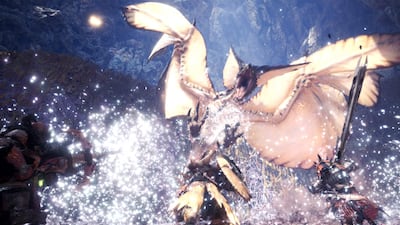The great sword is my favourite weapon in Monster Hunter: World. It is almost twice as long as my player character is tall, and he must be more than seven feet. Impractically gargantuan blades are a video-game staple, the Buster Sword from Final Fantasy VII being the most iconic example.
This being a fantasy world, we take it for granted that characters can handle a sword that weighs more than a heavyweight boxer as if it was no more cumbersome than a steak knife. Who is going to let the matter of realistic physics get in the way of a stunning spectacle?
Well, the minds behind MH:W, for one. My great sword feels every bit the heavy metal monstrosity, with my character visibly straining to lift the weapon above his head before being dragged along for the ride as the momentum pulls him in the direction of a successfully executed overhead strike.
Its weight also means that the blade can get stuck in the ground after delivering a particularly forceful blow, leaving you defenceless for the nerve-racking few seconds it takes to free it.
This approach to weapon handling is just one of the ways in which MH:W differs from most mainstream triple-A releases. A long learning curve, comparative lack of hand-holding and an absence of loot boxes are some of the others.
MH:W is being released in the middle of a revival of Japanese game developers' fortunes in the West, a result of commercial and critical successes such as NieR:Automata, The Legend of Zelda: Breath of the Wild and Persona 5. These titles have been a timely reminder of the vitality, talent and innovation that led to an almost complete Japanese domination of American and European sales charts and gamers' hearts for long stretches of video-game history. Even during the slump preceding the current resurgence, established franchises originating in Japan could always count on strong media coverage and good sales – even if not always great scores from critics – outside their home country.
Capcom's Devil May Cry, Street Fighter, Marvel vs Capcom and Resident Evil are examples, but its monster Monster Hunter series just hasn't been caught on in the same way. It has produced a string of smash hits in Japan and the East since the first game's release in 2004, but success elsewhere has remained elusive outside niche gaming communities.
_________________
Read more:
Nintendo profit best in eight years
Why talk of Nintendo's Switch-led turnaround may be premature
_________________
MH:W is Capcom's attempt to finally break into the global mainstream, presenting a Monster Hunter experience curated for newcomers. This is not to say that the game isn't complex enough to keep veterans interested – there is more depth here than you will find in most games, thanks to a multitude of intricate systems that interact to produce the series' signature action experience. It is all in service to a gameplay loop that consists of enhancing your skills and equipment to the point where you are capable of slaying one of the host of incredibly designed monsters, then using the resources provided by its carcass to upgrade your weapons and armour so you can take on more dangerous and difficult-to-kill prey.
There are countless ways to bring down any monster, and how you combine one of the 14 weapon types on offer with potions, traps and other tools at your disposal is up to you. The incredible sense of achievement that comes with taking down a dangerous foe – often only after several failed attempts that force you to rethink your strategy or try different weapons – is the highest point in the loop. But the other parts are as exciting and engaging in their own way, making everything you encounter and everything you do in the beautifully realised fantasy world seem somehow a meaningful part of your growth as a hunter.
MH:W is not a game for everyone, however. It may look like just another hack-and-slash adventure, but the combat is a lot more methodical and challenging than in your average action game. If you want something you can play for a few minutes at a time to let off some steam, look elsewhere. However, if you want a game into which you can easily sink for a few hundred hours, then MH:W is for you.


